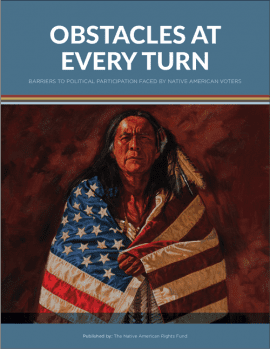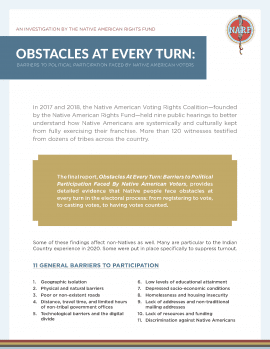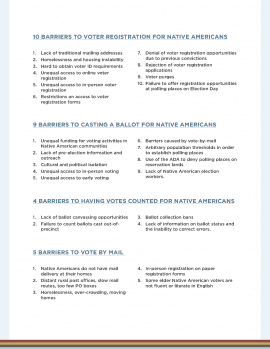 In 2017 and 2018, the Native American Voting Rights Coalition—founded by the Native American Rights Fund—held nine public hearings to better understand how Native Americans are systemically and culturally kept from fully exercising their franchise. More than 120 witnesses testified from dozens of tribes across the country.
In 2017 and 2018, the Native American Voting Rights Coalition—founded by the Native American Rights Fund—held nine public hearings to better understand how Native Americans are systemically and culturally kept from fully exercising their franchise. More than 120 witnesses testified from dozens of tribes across the country.
The final report, Obstacles at Every Turn: Barriers to Political Participation Faced by Native American Voters, was released June 4, 2020, and provides detailed evidence that Native people face obstacles at every turn in the electoral process: from registering to vote, to casting votes, to having votes counted.
Some of these findings affect non-Natives as well. Many are particular to the Indian Country experience in 2020. Some were put in place specifically to suppress turnout.
Download the full report at https://vote.narf.org/obstacles-at-every-turn/.
Download a summary of the report’s findings including recommendations for a way forward.

11 GENERAL BARRIERS TO PARTICIPATION
- Geographic isolation
- Physical and natural barriers
- Poor or non-existent roads
- Distance, travel time, and limited hours of non-tribal government offices
- Technological barriers and the digital divide
- Low levels of educational attainment
- Depressed socio-economic conditions
- Homelessness and housing insecurity
- Lack of addresses and non-traditional mailing addresses
- Lack of resources and funding
- Discrimination against Native Americans
10 BARRIERS TO VOTER REGISTRATION FACED BY NATIVE AMERICANS
- Lack of traditional mailing addresses
- Homelessness and housing instability
- Hard to obtain voter ID requirements
- Unequal access to online voter registration
- Unequal access to in-person voter registration
- Restrictions on access to voter registration forms
- Denial of voter registration opportunities due to previous convictions
- Rejection of voter registration applications
- Voter purges
- Failure to offer registration opportunities at polling places on Election Day

9 BARRIERS TO CASTING A BALLOT FACED BY NATIVE AMERICANS
- Unequal funding for voting activities in Native American communities
- Lack of pre-election information and outreach
- Cultural and political isolation
- Unequal access to in-person voting
- Unequal access to early voting
- Barriers caused by vote-by-mail
- Arbitrary population thresholds in order to establish polling places
- Use of the ADA to deny polling places on reservation lands
- Lack of Native American election workers.
4 BARRIERS TO HAVING VOTES COUNTED FACED BY NATIVE AMERICANS
- Lack of ballot canvassing opportunities
- Failure to count ballots cast out-of-precinct
- Ballot collection bans
- Lack of information on ballot status and the inability to correct errors.
6 BARRIERS TO VOTE BY MAIL FACED BY NATIVE AMERICANS
- Native Americans do not have mail delivery at their homes
- Distant rural post offices, slow mail routes, too few PO boxes
- Homelessness, over-crowding, moving homes
- In-person registration on paper registration forms
- Some elder Native American voters are not fluent or literate in English
RECOMMENDATIONS & THE WAY FORWARD
In the United States, power is available through participatory democracy. If Native Americans can engage fully in the political system—free from the barriers that currently obstruct them—they can reclaim power and participate in America in a way that is fair and just.
The first critical step: Congress must pass the Native American Voting Rights Act, or its component pieces in other legislation. This bill will ensure that Native Americans have access to political participation by starting to address the obstacles outlined in this report. For example, mandating polling places on reservations will cut down travel time and allow Native American voters to cast a ballot in a familiar place free from discrimination.
States and state officials should make sure election activities for Native Americans are equitably funded and establish Native American task forces to ensure Native American citizens are provided equal access to registration and voting opportunities within their states. States should not require a physical address, or proof of a physical address, to register or cast a ballot.
Local election officials should reach out directly to tribes to consult about placement of vote centers with registration opportunities and polling places within Native communities and recruit Native American community members to work as poll workers and local election officials. For vote by mail specifically, election officials should ensure safe curbside voting and ballot drop boxes, and deploy mobile registration and voting stations. Election day postmarks should be accepted as the norm, as should postage-paid ballots. Third parties should be allowed to collect ballots and drop off completed ballots, and there must be a process for rectifying signature match issues.
Tribes should encourage their members to participate in state and federal elections as a way to increase political power, reach out to and work with county officials to increase voter access for their members, and issue voter guides to de-mystify voting processes and ballot initiatives that affect the tribal community. Tribes should make voter registration for state and federal elections available in all tribal buildings and encourage registration at every point of contact with tribal members.
Tribal citizens should register and vote, and encourage their families and friends to register to vote. They should arrange voter registration drives and reach out to their tribal governments expressing enthusiasm for get out the vote efforts.
Concerned citizens and activists should reach out to their elected officials, including their Secretary of State, to insist upon equitable access for Native Americans by inquiring whether the state has a Native American task force, insist upon voting opportunities on Native American lands, and demand funding for Native American voting and registration opportunities.
More blog posts

